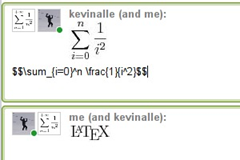Bollocks to waiting 10 years for progress
March 23rd, 2011 by MarkI read a good quote the other day:
So why do we wait? Why isn’t there immediate publication, analysis and dissemination of data? Publication of Scientific data as it stands is a broken business model…for the most part. The advent of journals like PLoS and their subsequent success shows that the scientific community is taking note of what steps need to be taken. In my short life as a scientist, there has always been one thing that really annoys me. The inefficiency of scientific publishing and subsequent global sharing of knowledge. In terms of making significant advances available to wide audiences as peer reviewed publications, PLoS has it covered. But what about the rest of your research?
 What percentage of the figures that went into your undergrad, masters or doctorate thesis were ever published? The ones that you didnt publish were probably good basic science, or figures that didnt tell a complete story. As a PhD student, I became very aware of the fact that a large amount of my data, although good, would never be published as it did not show significant differences. I then began wondering how many times experiments had been repeated globally unnecessarily. And so FigShare started life as an idea for researchers to publish all of their data that would otherwise never leave their lab books. By categorising and tagging the research, it becomes very searchable and other scientists should not reproduce experiments and waste money when they have been conducted several times by other labs. Following the alpha release, FigShare received a lot of attention and a lot of feedback. This caused the site to develop and it now allows the upload of Figures, Datasets and most recently media (eg. videos).
What percentage of the figures that went into your undergrad, masters or doctorate thesis were ever published? The ones that you didnt publish were probably good basic science, or figures that didnt tell a complete story. As a PhD student, I became very aware of the fact that a large amount of my data, although good, would never be published as it did not show significant differences. I then began wondering how many times experiments had been repeated globally unnecessarily. And so FigShare started life as an idea for researchers to publish all of their data that would otherwise never leave their lab books. By categorising and tagging the research, it becomes very searchable and other scientists should not reproduce experiments and waste money when they have been conducted several times by other labs. Following the alpha release, FigShare received a lot of attention and a lot of feedback. This caused the site to develop and it now allows the upload of Figures, Datasets and most recently media (eg. videos).
(more…)

